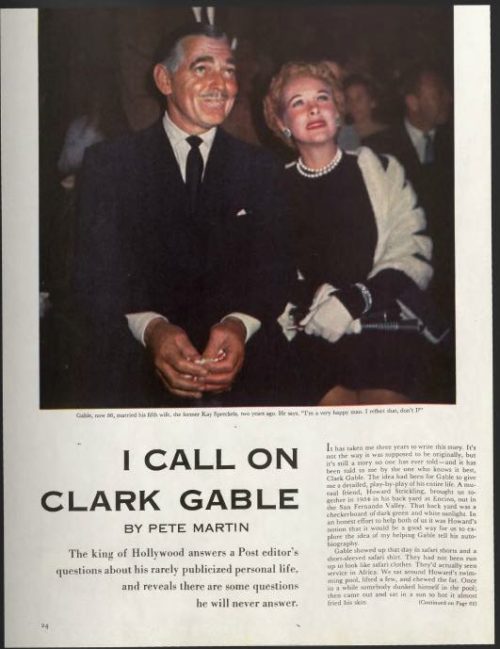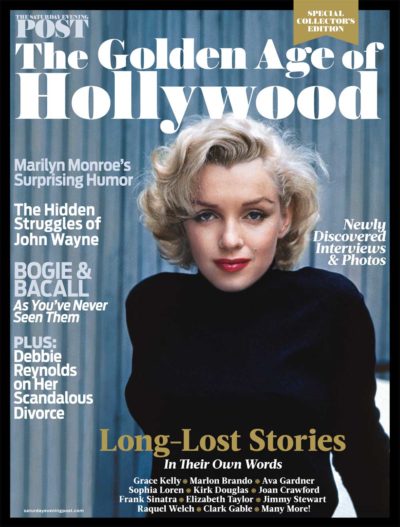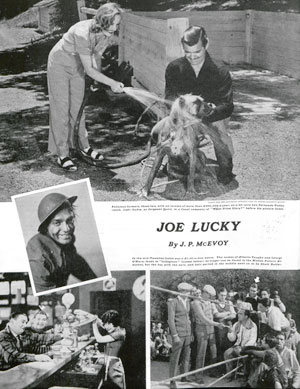Leading Men of Hollywood: Clark Gable
This article was originally published in the Post on October 5, 1957. This and other features about the stars of Tinseltown can be found in the Post’s Special Collector’s Edition, The Golden Age of Hollywood, which can be ordered here.
My wife, Kay, is stopping by at 3 o’clock to pick me up,” Clark Gable told me when he walked into my hotel room for our interview. “You ask me questions, and I’ll tell you the truth. If you ask me something too personal, I’ll say, ‘that’s a question I don’t care to answer; I’m keeping that to myself.’ But if you ask me something that I feel I can answer honestly, I will.”
After I’d tried unsuccessfully to ask him a few personal questions, I asked him about three pictures he’d been in: IT HAPPENED ONE NIGHT, MUTINY ON THE BOUNTY and GONE WITH THE WIND. “I’ve heard you wanted to be in none of them,” I said, “but in each case somebody talked you into changing your mind.”
“IT HAPPENED ONE NIGHT came along early in my motion-picture career,” he said. “For two years after M-G-M put me under contract, I pulled guns on people or hit women in the face. Then M-G-M assigned me to a bad part in DANCING LADY, with Joan Crawford—a picture I didn’t like. But as bad as the part was, it wasn’t as bad as my health.”
“What was wrong with you?” I asked.
“I’d lost a lot of weight. They’d been working me hard, and I was tired. I told myself, ‘If I have a few operations, that will take care of my health and the part in DANCING LADY too.’ I had my appendix and my tonsils out, but it didn’t take care of everything, for M-G-M was mad at me. For some strange reason they thought I’d taken evasive action to avoid their picture. They bided their time during the eight or nine weeks I was in the hospital. Then the very day after I got out they called me in and said, ‘We’re sending you over to Columbia Pictures on a loan-out.’”
“Was that punishment?” I asked.
“At that time Columbia was on the wrong side of the tracks,” Gable said, “and being sent there was a this-will-teach-you-a-lesson deal. I didn’t know anybody at Columbia, but I’d been told, ‘Report to Frank Capra,’ so I reported to him.
“Frank is a nice guy, and he was tolerant of my attitude, which, to put it mildly, wasn’t good. He didn’t know I felt that I had just been swept out of M-G-M’s executive offices with the morning’s trash. I took home the script of IT HAPPENED ONE NIGHT, and I read it. I had a couple of drinks and thought, It can’t be that good. I’d better look at it later. So I had dinner and read it again. It was still good. The next morning, I called Frank and said, ‘I want to apologize for my behavior yesterday. I was rude, and I had no reason to be. You’ve got a fine script. Why you’ve chosen me to be in it I don’t know. You’ve never seen me play comedy on the screen.’”
“Did he ever tell you why he chose you,” I asked.
“I don’t know to this day,” Gable said. “I told him, ‘If you think I can do it, I’ll try, but after three or four days, if you don’t like what you see on the screen, you can call the whole thing o and there’ll be no hard feelings.’ We worked a few days; Frank came to me and said, ‘We’ll have no trouble.’”
In the end, the lm’s female star, Claudette Colbert, and Gable himself won Academy Awards for the year’s best performance by an actress and actor. The picture itself won the award as the outstanding production of 1934. Capra won an Oscar for his direction. Writer Bob Riskin won a similar award for the year’s best screenplay.
Other Roles Nearly Missed
“I didn’t want to be in the second picture you mentioned, MUTINY ON THE BOUNTY, because it was a story about
a crew of Englishmen, and since I obviously wasn’t English, I felt I was badly miscast.
“For a while there was a deadlock. It was broken by Kate Corbaley, who headed M-G-M’s story department. God rest her soul—she’s dead now—but she was a wonderfully kind, white-haired, brilliant woman. She knew I was giving Irving [Thalberg, one of the film’s producers,] a bad time, and she didn’t like civil war in the studio, so she came to me and said, ‘I think you’re making a mistake. I’ve read this story, and I can’t see anybody else playing Fletcher Christian but you.’
“‘Not me, Kate,’ I said stubbornly. “I’d have to wear knee britches and a three-cornered hat. That’s more than I can stomach.’
“‘Don’t be such a mule,’ she told me. ‘Listen.’ So I listened, and after I listened, I said, ‘O.K., let’s go,’ although I still didn’t like it.”
“Did you feel better about it as you went along?” I asked.
“Not me,” he said. “I told everybody who’d listen, ‘I stink in it.’ I didn’t realize I was wrong for several months. But after the studio previewed MUTINY, I got a cablegram from Thalberg: ‘The movie is wonderful. We’re proud of it. You’ll like yourself in it.’ I had to believe Irving because he was a guy you could believe. He didn’t kid himself or anybody else.”
“I don’t see how you could have avoided playing Rhett Butler in GONE WITH THE WIND,” I said. “The whole country cast you in it long before the cameras began to roll.”
“That was exactly the trouble,” Gable clarified. “Not only that but it seemed to me that the public’s casting of me was being guided by an elaborate publicity campaign.”
I disagreed. “That casting was a natural thing,” I said. “No studio or producer controlled it. I sat in any number of bull sessions in friends’ homes while we cast that picture. Nobody said we ought to cast it; we just did. And the way we nonmovie employees cast it was the way it was eventually cast on the screen. Almost everybody agreed on you as Rhett Butler, Leslie Howard as Ashley and Olivia DeHaviland as Melanie.”
“My thinking about it was this,” Gable told me, “that novel was one of the all-time best sellers. People didn’t just read the book; they lived it. They visualized its characters, and they formed passionate convictions about them in their minds. You say a lot of people thought I ought to play Rhett Butler, but I didn’t know how many had formed that opinion.”
“Enough,” I said.
“There are never enough,” he told me. “But one thing was certain: They had a preconceived idea of the kind of Rhett Butler they were going to see, and suppose I came up empty?”
I’d never heard that phrase before, so he explained, “I thought, All of them have already played Rhett in their minds; suppose I don’t come up with what they already have me doing. Then I’m in trouble. If they saw one thing I did that didn’t agree with their remembrance of the book, they’d howl. I’d done the same thing when I’d wanted to be a Shakespearean actor. I’d taken a copy of HAMLET or RICHARD II or OTHELLO to the theater with me, and I’d checked on the Shakespearean actors. I’d say, ‘Why that — missed an “and” or ‘He left out a “but.” He can’t do that.’”
“I’ve seen GONE WITH THE WIND three times,” I told him, “and I had the feeling you enjoyed it.”
“It was a challenge,” he said. “I enjoyed it from that point of view. But my chin was out to there. I knew what people expected of me and suppose I didn’t produce?”
“But you did produce,” I said.
“Maybe so,” he said noncommittally.
“When did you finally get it through your head you’d done all right?”
He said, “The night we opened in Atlanta, I said, ‘I guess this movie is in.’”
“How did you figure that?” I asked. “Did you enjoy it yourself or did you gauge it by other people’s reactions?”
“Other people’s reactions,” he said.
I said, “Have you ever considered retirement? What do you think about your future?”
“That’s a logical question, and I’ll give you a logical answer,” he said. “When the public doesn’t want me any longer, I’ll quit.”
“How will you know?” I asked.
“I don’t want to stay around long enough to bore people, and I won’t. They have their own way of expressing themselves, and unless an actor is looking the other way, he can see the warning. But as long as the people still go to see my films, I’ll do my best to entertain them.”

 This article and other features about the stars of Tinseltown can be found in the Post’s Special Collector’s Edition, The Golden Age of Hollywood, which can be ordered here.
This article and other features about the stars of Tinseltown can be found in the Post’s Special Collector’s Edition, The Golden Age of Hollywood, which can be ordered here.
Gable Feared Failure as Rhett Butler
If this year’s crop of Oscar contenders seemed thin and unappetizing to you, remember that not all growing seasons are alike. Hollywood has had some truly remarkable years.
Take 1939 for example, a year in which the motion picture industry outdid itself. Hollywood released 10 movies that, even today, seem to deserve their Oscar nominations for Best Picture. Dark Victory; Ninotchka; Of Mice and Men; Wuthering Heights; Love Affair; Goodbye, Mr. Chips; Stagecoach; The Wizard of Oz; and Mr. Smith Goes to Washington. Topping the list was 1939’s most anticipated movie — Gone with the Wind, nominated for 13 Oscars.
Many considered Gone with the Wind and Mr. Smith the strongest candidates. Not surprisingly, the leading men of both films were nominated for Best Actor. Jimmy Stewart as the idealistic, young Congressman Jefferson Smith was up against Clark Gable as the dashing Rhett Butler.
More than 75 years after Gone with the Wind was released, Gable’s performance still symbolizes a masculine ideal for some people. The character he played, the cynical but chivalrous Butler, was one of the chief attractions of the novel on which the movie was based.
The book had been released in 1936, and hundreds of thousands of readers were captivated by the turbulent romance between Butler and the headstrong Scarlett O’Hara. In the first six months after its release, a million copies of the book were sold, despite being priced at an exorbitant $3 (equivalent to $50 today) in the middle of the Depression.
After producer David O. Selznik bought the movie rights to the book, the Warner Brothers’ studio launched a broad and well-publicized search for the ideal actress to play O’Hara. Names like Bette Davis, Katherine Hepburn, Jean Harlow, even Lucille Ball were tossed around. But for Rhett Butler, there could only be one actor: Clark Gable.
The only person who didn’t think he should play the part, it seems, was Gable himself. He told the Post’s Pete Martin in 1957, “My thinking about it was this, that novel was one of the all-time best sellers. People didn’t just read it, they lived it. … They had a preconceived idea of the kind of Rhett Butler they were going to see, and suppose I came up empty? … All of them have already played Rhett in their minds. … If they saw one little thing I did that didn’t agree with their remembrance of the book, they’d howl.” (“I Call On Clark Gable” by Pete Martin, The Saturday Evening Post, October 5, 1957)
Even after the movie, he fretted that he hadn’t done justice to the role. He told Martin it wasn’t until he saw the enthusiastic crowds at the Atlanta premier that he admitted, “I guess this movie is in.”

Gable should have worried. Two months after the premier, Gone with the Wind was still showing in 400 theaters and earning $2 million a week ($34 million today). And now Gable was its best-paid actor, reported J.P. McEvoy in his 1940 interview with the star.
Gable’s success with the film only increased the large following he’d gained over the years. His big break, which earned him a Best Actor award, came in the 1934 film It Happened One Night.
Two years after the film’s release, a New York mob had attacked the cab he was riding in, demanding that he come out or they’d overturn the taxi. The police had to break through and drag him to safety. In New Orleans, “a yelling mob of women and girls tore most of his clothes off and made away with all his baggage,” McEvoy wrote. “In Baltimore a thousand women, waiting at the station, mobbed him. One girl hung on his neck as he dashed from the station to a waiting auto. In Santiago, Chile, he lost everything, including his pajamas.”
To a lesser degree, Gable was making a strong impression on American men, too. He was the new role model. Young men were moving away from the sleek, sophisticated look of the 1920s. Now muscular, well-built figures were fashionable, made popular by actors like Spencer Tracy, Jimmy Cagney, Gary Cooper, and, of course, Clark Gable.
American men, wrote McEvoy, “started wearing broad-shouldered coats — reversing the current style trend, still influenced by Valentino — for millions of women were now sighing to share the adventures of this dashing he-man, and millions of men were going to look like he-men, even if they had to pad out their thin, round shoulders to create an illusion of virility.”
Gable’s style even influenced men’s underwear. In a scene from It Happened One Night, wrote McEvoy, “Gable stripped off his shirt and revealed a bare and undeniably healthy torso. A million American men and boys said, ‘What’s good enough for Gable is good enough for us,’ and the undershirt business has never recovered.”
Years later, Gable revealed the reason behind his unintended bold fashion statement to Pete Martin. “That was just the way I lived. I hadn’t worn an undershirt since I’d started to school. They made me feel hemmed in and smothered. I still felt that way when I joined the Air Force in World War II and I had to put on a T-shirt. I felt swathed in fabric, like a mummy.
No one denied Gable made a strong impression on American men and women. But would his performance in Gone with the Wind make a favorable impression on the Academy of Motion Picture Arts and Sciences?
On February 21, 1940, Hollywood gathered at the Coconut Grove in LA’s Ambassador Hotel for the 12th annual awards ceremony. The Best Actor award was given late in the evening. Until then, Bob Hope was busy as a first-time host. (Hope was called back to reprise this role 18 more times.)
Thomas Mitchell won Best Supporting Actor for his performance in Stagecoach, though he’d done good work in Gone with the Wind , too. Another member of that movie’s cast, Hattie McDaniel won Best Supporting Actress for her “mammy” character. She was the first black American to win an Oscar. Vivian Leigh, who played opposite Clark Gable as Gone with the Wind’s Scarlett, beat Bette Davis (Dark Victory) for Best Actress.
But Robert Donat won Best Actor for his performance as an aging English schoolmaster in Goodbye, Mr. Chips.
Not only did Gable not win that year, he never even received an Oscar nomination for any of the 28 films he made throughout the remainder of his career.
And yet, Gable’s Rhett Butler has remained a durable American icon after three-quarters of a century. Which is something else to remember when you think of the Academy Awards. While “winners” like Donat can become answers to movie-trivia questions, we remember “losers” like Jimmy Stewart and Clark Gable.